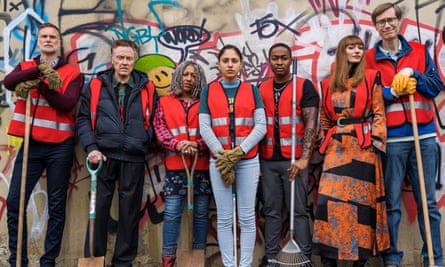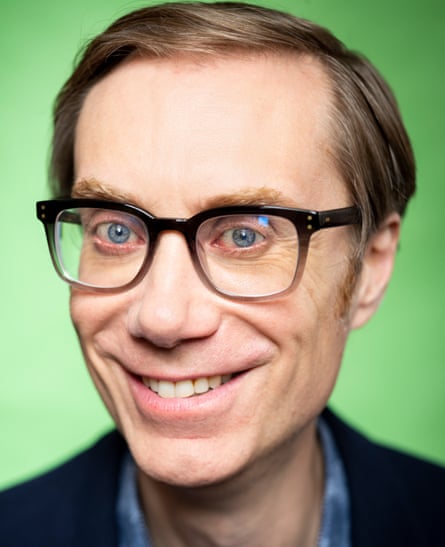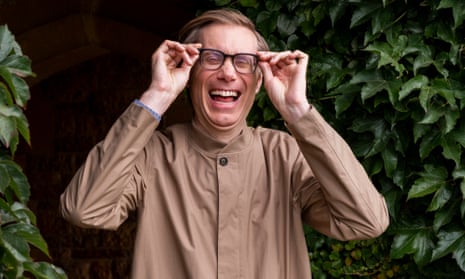Stephen Merchant, 46, is a writer, producer, director and comic actor who rose to fame in 2001 with The Office, about life at a paper supply company in Slough. Created by Merchant and his former XFM co-presenter Ricky Gervais, the awards-festooned series spawned a US version starring Steve Carell, and is credited with prompting a new wave of comedy series that dispensed with laughter tracks and punchlines in favour of a mockumentary style. The pair followed up The Office with Extras, in which Merchant played incompetent agent to Gervais’s struggling actor, amid a feast of celebrity cameos. In 2013 he wrote and starred in the HBO sitcom Hello Ladies, a series based on his standup routine and which followed an Englishman in Los Angeles and his failed attempts at dating. Elsewhere, he has worked variously as a DJ on BBC 6 Music, a podcaster and voiceover artist, and has appeared in films including Hot Fuzz and Jojo Rabbit.
Merchant’s new six-part series, The Outlaws, co-created with Elgin James, follows the fortunes of seven strangers doing community service in Merchant’s former hometown of Bristol. Characters include Darren Boyd’s reactionary businessman, Clare Perkins’ diehard activist, Eleanor Tomlinson’s spoilt influencer, Merchant’s sad-sack solicitor – and Christopher Walken in his first role in a British comedy, as a career criminal fresh out of prison.
The Outlaws starts as a gentle sitcom and then turns into a comedy-thriller. Were you deliberately messing with audience expectations?
Yes, in part. I like there to be humour in things but what I often go to, if I’m watching TV, is thrillers. So I’m trying to have my cake and eat it. I watched a lot of Hitchcock growing up, and I liked that there was a wink and humour to it as well as a suspense element. My favourite episodes of The Sopranos have that – there’s the Pine Barrens episode when Paulie and Christopher are trying to kill a Russian hitman and they get stuck in this snowy wasteland, with Paulie losing his shoes. So I like the idea of fusing different sensibilities. I kept thinking of The Outlaws as a western, but a really pedestrian, suburban, low-rent kind of western.
Community service seems an ideal setup for throwing different characters together. Have you ever done it?
I haven’t had any run-ins with the law, I’m pleased to say, but my parents used to work for community service when I was growing up, so I knew it would be an interesting backdrop. My mother would supervise offenders on placements, just like Diane [the character played by Jessica Gunning], though I like to think my mum was less officious.
Did your mum talk about her work?
She would share little things. She told me there was an old guy who was constantly being caught stealing cabbages from people’s allotments, and over time they realised he was lonely so he would commit these minor offences to meet new people. A couple of kids I went to school with passed through her ranks, too. They’d say: “How’s Stephen doing?” And my mum would say: “Yeah, he’s at university. Anyway, I notice you’ve been stealing bikes.”
What did it take to get Christopher Walken on board?
I flew to New York and then I took a car to Connecticut where he lives. It was the middle of winter and it’s a remote house. When I got there, he sent the car away, a bit like Dracula sending the carriage off when the lawyer arrives at the castle. I’d never met him before and he’s quite an imposing presence, partly because your associations come from him playing mobsters or psychopaths. The first thing he said to me was [adopts Walken’s raspy, halting tones]: “Would you … like some … of this omelette?” I’d just eaten a giant breakfast but I thought: “I can’t turn down Christopher Walken’s omelette,” so I sat there stuffing omelette into an already full stomach. But I think we hit it off. With a lot of actors of his calibre and vintage, there’s a sense that they’re phoning it in at this point – it’s just a payday for them. But he couldn’t have been more plugged in and invested.
What did he make of Bristol?
Well, I told him before he arrived that Bristol reminded me of San Francisco, which I don’t think is entirely fanciful when you stop to think about it. It’s very hilly, it has a bohemian subculture and a big bridge. Of course, once he arrived we were filming through lockdown. So we made all these grand claims about Bristol and then he only ever saw it from his car on the way to set.

There is a down-to-earth quality to the comedies you write, which often feature ordinary people in dour environments. Do you see yourself throwing it all up in the air and writing a space opera?
I would quite enjoy doing an action blockbuster, a Fast & Furious-type thing, largely because I enjoy watching them and they’re so preposterously over the top. But my heart always lies with stuff that feels like it exists in the real world. I’m not particularly into fantasy or Lord of the Rings. It just seems that there’s enough interesting stuff going on in the local pub that I don’t need to start inventing elves.
Do you get a gut feeling when a show is going to be a hit?
This is not false modesty when I say I genuinely have no idea what people want. After our success with The Office I was, like: “Well, clearly I have the Midas touch,” but I’ve since realised I haven’t a clue. I was involved with this show Lip Sync Battle. Who would have known that the world would want four seasons of a show in which celebrities are lip-syncing to songs? On one episode, Stevie Wonder came on and mimed to a Stevie Wonder song. It’s the maddest thing I’ve ever seen.
Can you tell me about playing the British serial killer Stephen Port in the forthcoming drama Four Lives? [The series was filmed two years ago, but has been delayed until the inquests into Port’s victims have been completed.]
It was a real departure for me, and not just because I had to shave my head, wear fake teeth and have a different accent. There’s no way of understanding a killer’s thought processes so you have to create your own kind of analysis of that, and your own internal logic. Throughout the trial, for instance, which they recreated quite closely, he’s clearly lying sometimes and then he’s also clearly telling the truth at other times, and the two seem to fold in on top of each other. So that was a meaty thing to get my fake teeth into. It was actually one of the first acting jobs I’ve done that I’ve enjoyed, as I often find acting a bit boring. I’ve always thought of myself as a writer and director first and then acting is something I do, either because there’s an obvious role for me or because a fun thing comes up and I think it looks like a laugh.

This is going to sound impertinent but, when you were growing up, what made you think you could be funny?
It’s a valid question. I think firstly because my dad was and is very funny. He was always a fan of movie comedy in particular, so from a young age I was watching Bob Hope, the Marx Brothers and Laurel and Hardy. Then later came Fawlty Towers and Monty Python. There was also that awkward teenage thing of controlling when people laugh at you that was appealing. I was very tall so people were always pointing at me and commenting on me long before I was on TV. So I thought: ‘Well if you’re going to stare at me, I may as well be performing in some way.’
You became known for your work with Ricky Gervais, initially on the radio station XFM and later on The Office. What was your working relationship like?
Ricky’s job [at XFM] was head of speech and he decided he needed an assistant head of speech. These were entirely madeup roles and we were supposed to provide content for the DJs, but we weren’t good at that and we ended up going on the air and being funny. There was an immediate feeling that we knew what the other one was thinking, even though we would constantly surprise each other. I think there was an ease and trust, so we could go on air and rely on each other to simply keep the ball in the air.
When you went your separate ways, was it freeing or did it feel like losing a limb?
It wasn’t a conscious parting of the ways as much as just naturally wanting to do slightly different things. I went off to do my show Hello Ladies, which was based on my standup and which was very much about single life, and that wasn’t something Ricky had experienced for a long time. Since then, I’ve collaborated with various people and I do think that being in the trenches with someone else is really helpful. You don’t feel alone and you have each other’s back. When I’ve done stuff without a partner in crime, it is definitely more stressful.
Do you still love comedy that makes you cringe as well as laugh?
I’m not setting out to make you feel awkward or uncomfortable – that’s not my ambition. But I’m always aware of social awkwardness and I feel my most agonising moments are during the times where things go wrong socially, so I think comedy is a way of dealing with that.
Do you store those moments away for later?
Oh yes, always. I was once at a cool Hollywood party hosted by the comedian Sarah Silverman where I ate a piece of chocolate that I didn’t realise was laced with pot. I was immediately obliterated by it. I’m six foot seven but it turns out I do not have the constitution of Willie Nelson. So I went out to get some air and, the next thing I knew, I had just walked through an 8ft plate glass window. One minute I was inside, the next I was outside surrounded by shattered glass, and the party had gone silent like a saloon bar in an old western.
That sounds mortifying …
It was embarrassment on a cinematic level. But, once I’d worked out I was OK, my first thought was: this could be great for a scene in a TV show.
The Outlaws starts 25 October, 9pm, BBC One

Comments (…)
Sign in or create your Guardian account to join the discussion